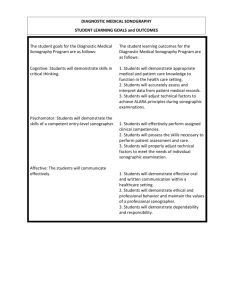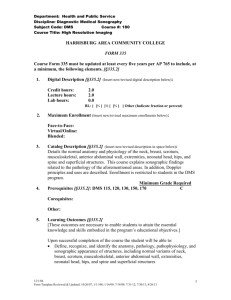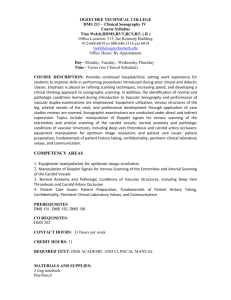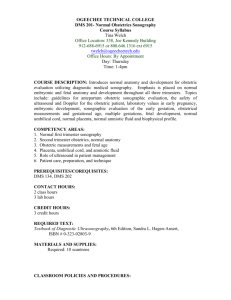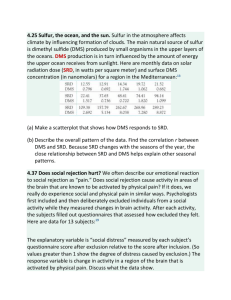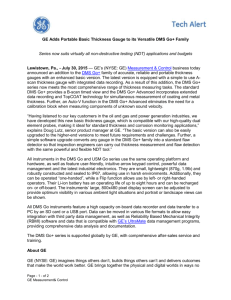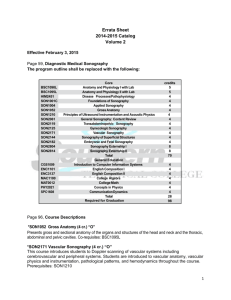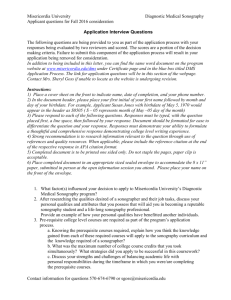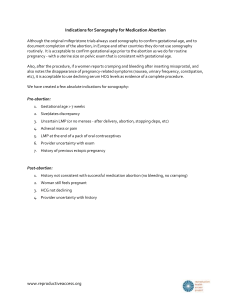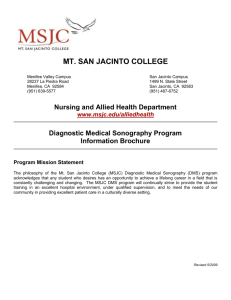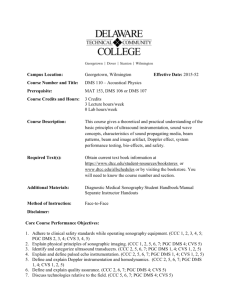Program Information Pamplet
advertisement
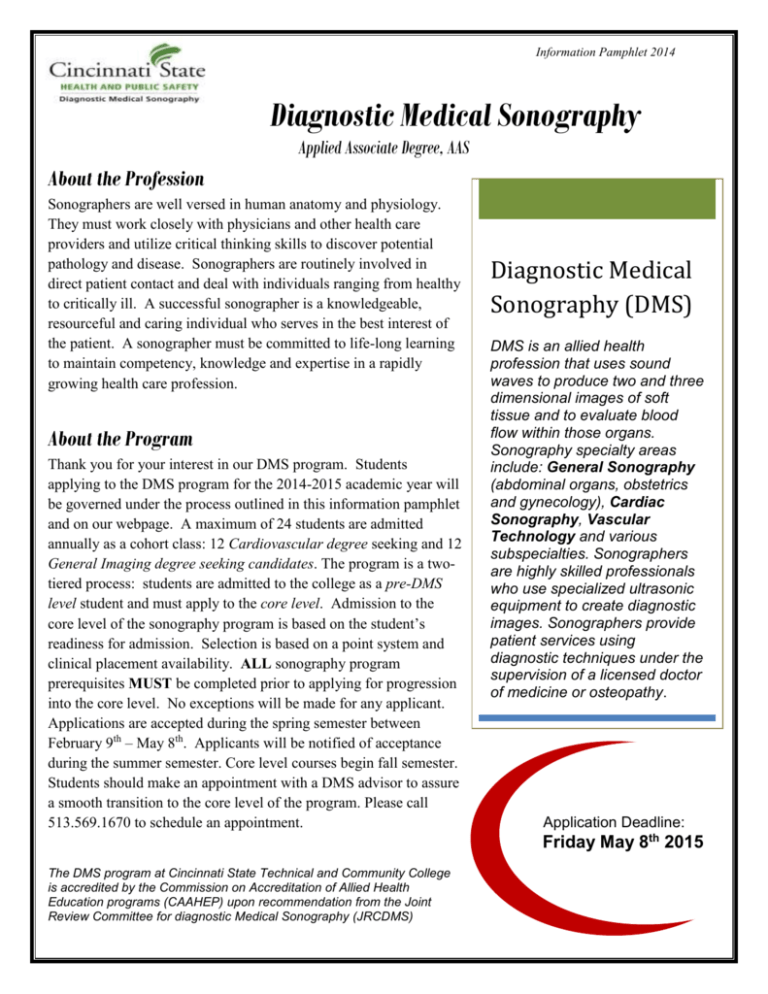
Information Pamphlet 2014 Diagnostic Medical Sonography Applied Associate Degree, AAS About the Profession Sonographers are well versed in human anatomy and physiology. They must work closely with physicians and other health care providers and utilize critical thinking skills to discover potential pathology and disease. Sonographers are routinely involved in direct patient contact and deal with individuals ranging from healthy to critically ill. A successful sonographer is a knowledgeable, resourceful and caring individual who serves in the best interest of the patient. A sonographer must be committed to life-long learning to maintain competency, knowledge and expertise in a rapidly growing health care profession. About the Program Thank you for your interest in our DMS program. Students applying to the DMS program for the 2014-2015 academic year will be governed under the process outlined in this information pamphlet and on our webpage. A maximum of 24 students are admitted annually as a cohort class: 12 Cardiovascular degree seeking and 12 General Imaging degree seeking candidates. The program is a twotiered process: students are admitted to the college as a pre-DMS level student and must apply to the core level. Admission to the core level of the sonography program is based on the student’s readiness for admission. Selection is based on a point system and clinical placement availability. ALL sonography program prerequisites MUST be completed prior to applying for progression into the core level. No exceptions will be made for any applicant. Applications are accepted during the spring semester between February 9th – May 8th. Applicants will be notified of acceptance during the summer semester. Core level courses begin fall semester. Students should make an appointment with a DMS advisor to assure a smooth transition to the core level of the program. Please call 513.569.1670 to schedule an appointment. Diagnostic Medical Sonography (DMS) DMS is an allied health profession that uses sound waves to produce two and three dimensional images of soft tissue and to evaluate blood flow within those organs. Sonography specialty areas include: General Sonography (abdominal organs, obstetrics and gynecology), Cardiac Sonography, Vascular Technology and various subspecialties. Sonographers are highly skilled professionals who use specialized ultrasonic equipment to create diagnostic images. Sonographers provide patient services using diagnostic techniques under the supervision of a licensed doctor of medicine or osteopathy. Application Deadline: Friday May 8th 2015 The DMS program at Cincinnati State Technical and Community College is accredited by the Commission on Accreditation of Allied Health Education programs (CAAHEP) upon recommendation from the Joint Review Committee for diagnostic Medical Sonography (JRCDMS) FREQUENTLY ASKED QUESTIONS: Qt: A: Qt: A: How do I apply to the program? 1.Submit an online application to the admissions office and specify your program interest as either: DMSC (cardiovascular associate degree program) or DMSG (general imaging associate degree program) 2. Take the COMPASS™ Test to determine math and English placement levels or request a waiver (online form) 3. Request official transcripts be sent to Cincinnati State College 4. Make an appointment with your financial aid officer 5. Make an appointment with the appropriate academic advisor (indicated on your Admission letter) Who is my academic advisor? All admitted pre-technology students working on developmental courses as indicated by the COMPASS™ exam must meet with an academic advisor in room 168 Main, prior to seeing a program advisor. Please make an appointment prior to registration in order to know which classes you should take before beginning your academic career at Cincinnati State College. Please call 513-569-1552 to make your appointment. Once you complete your Academic Foundations (AF) requirements and are ready to start the prerequisite courses, you may make an appointment with a DMS program advisor by calling 513-569-1670 Monday – Friday during normal business hours. Qt: A: What if I am unsure which DMS degree I am interested in pursuing? The Diagnostic Medical Sonography program at Cincinnati State offers a two-year associate degree of applied science for those who have limited or no health care experience. Students may choose between two areas of specialties: Cardiovascular Sonography or General Imaging Sonography. Cardiovascular sonography involves the demonstration and evaluation of structures within the heart and vascular systems. General Imaging sonography involves demonstration and evaluation of abdominal structures, superficial structures, pelvic structures and fetal structures. We recommend researching both programs to determine which specialty area is suitable to your personality. Information on careers in sonography may be found at www.ARDMS.ORG careers in Sonography section. Qt: A: When may I start classes? You may begin taking courses any semester. Due to the high demand of the program, you are strongly encouraged to work closely with the appropriate advisor in order avoid any unnecessary courses or delays in your progression. Advisor contact information is listed within this document. Qt: A: What are the admission requirements? Students must meet all college requirements for admission. Accepted students will be given a pre-DMS status. Initial acceptance to the DMS major allows students the ability to take the prerequisite courses for eligibility to apply for progression to the DMS core program. Transfer students must submit college transcripts to the registrar office to receive applicable transfer credit. Accepted students with less than 12 semester credits must complete the college-wide First Year Experience (FYE) course requirement as well. 2 Qt: A: What courses are required to apply for progression for the DMS program? The following prerequisite courses must be completed with a grade of C, S or better: PREREQUSITIES COURSES: BIO 151 Anatomy & Physiology 1 BIO 152 Anatomy & Physiology 2 MAT 150 Intermediate Algebra PHY 110 Health Physics DMS 100 Survey of Sonography MCH 101 Medical Terminology 1 MCH 138 Patient Care Skills CREDITS 4 4 5 3 3 2 2 All prerequisite and curriculum science courses must be completed < 5 years from the date of admission to the pre-DMS program. Some of the above courses may have additional prerequisite course requirements. Please check the course listing prior to registration. Qt: A: Are there additional requirements for progression? Yes, a cumulative grade point average (GPA) of >2.75* and a prerequisite course work GPA of >2.75 on a 4.0 scale will be tabulated for progression eligibility. Students must also have declared DMS as their major at least 2 semesters prior to submission of their application. The TEAS-AH, a basic aptitude assessment is required. A criminal background check is also required. *The cumulative GPA is based on at least 12 credit hours taken at Cincinnati State. Otherwise, the GPA from the transfer college/university will be used. Transfer courses applicable to progression that have been repeated for a passing or better grade will be considered as repeat courses. Qt: A: What do I need to do after my prerequisite courses are complete? Once you have completed your courses with the required GPA’s, you will be eligible to submit a Progression Application. There are optional criterion that may be used to increase your total score for progression such as: previous healthcare experience and/or education as well as scan lab observation sessions. In addition, attendance of a DMS Information Session is strongly suggested prior to submitting your application for progression. Please see the DMS website for dates @ http://www.cincinnatistate.edu/real-world-academics/academics/health-and-publicsafety/copy3_of_bt_program_template/Details Qt: A: What can I do while waiting to submit my application? Progression into the program will be based on a point system of the criterion. Acceptance to the college as a pre-DMS student and completion of required courses does not guarantee or constitute admittance into the DMS curriculum program. All students who are accepted for progression will be notified of their status by CState email. Accepted applicants may be required to submit to drug screenings during the core program. In addition, all accepted students must obtain CPR certification prior to clinical placement. While waiting for progression, students may begin working on completing courses contained in the curriculum –THESE ARE OPTIONAL prior to core level acceptance. 3 Core Level General Education courses: ENG 101 English Composition ENG 102 Composition and Argument MCH 141 Electrocardiography 1 BIO 240 Pathophysiology HUM XXX Humanities elective PSY 110 Introduction to Psychology COM 110 Public Speaking Credits: 3 3 3 3 3 3 3 *COM 1023 Interpersonal Communication will be substituted if taken prior to Fall 2012 Please note, the above courses are included in the semester curriculum. Completion of any of the above courses prior to acceptance into the core program may result in less than full time course load within that semester and may impact your financial aid eligibility. The Clinical Experience DMS core curriculum courses and the clinical experience begins following progression acceptance. Please see the catalog or website for the curriculum. Random and periodic drug screenings may be required by some clinical affiliates. Refusal or failure of screening may result in dismissal from the program. Qt: A: Will I be able to work while I participate in my clinical rotations? The program is intensive and requires a great amount of study. The clinical portion of the DMS curriculum level is a full time (40 hours a week), day time program. There may be occasional evening courses as well. Therefore, most students find it difficult to work full time while in the clinical portion of the program. If a student must work, we recommend working no more than 16 hours/week while in the curriculum DMS courses. Qt: Who should I call if I have additional questions concerning the program or the acceptance process? You may call the health division and make an appointment with any DMS program advisor or the program chair. They will be more than happy to advise you either in person, by phone or email. The health division may be reached at 513- 569-1670. The chair email address is Jackie.Turner@cincinnatistate.edu A: Qt: A: What is the salary range of an entry-level sonographer? New graduates may earn approximately $22.00 - $25.00 per hour. This will vary dependent upon the geographic area. Qt: A: Where can I obtain additional information on the DMS program and profession? Additional information about the Diagnostic Medical Sonography program may be obtained at www.Cincinnatistate.edu under the Health and Public Safety Division. Information about the profession may be found at our national society’s websites: www.sdms.org, www.asecho.org, and www.svunet.org THANK YOU FOR YOUR INTEREST IN OUR PROGRAM & WE LOOK FORWARD TO WORKING WITH YOU IN THE NEAR FUTURE! Effective May 2014 Information subject to change 4
